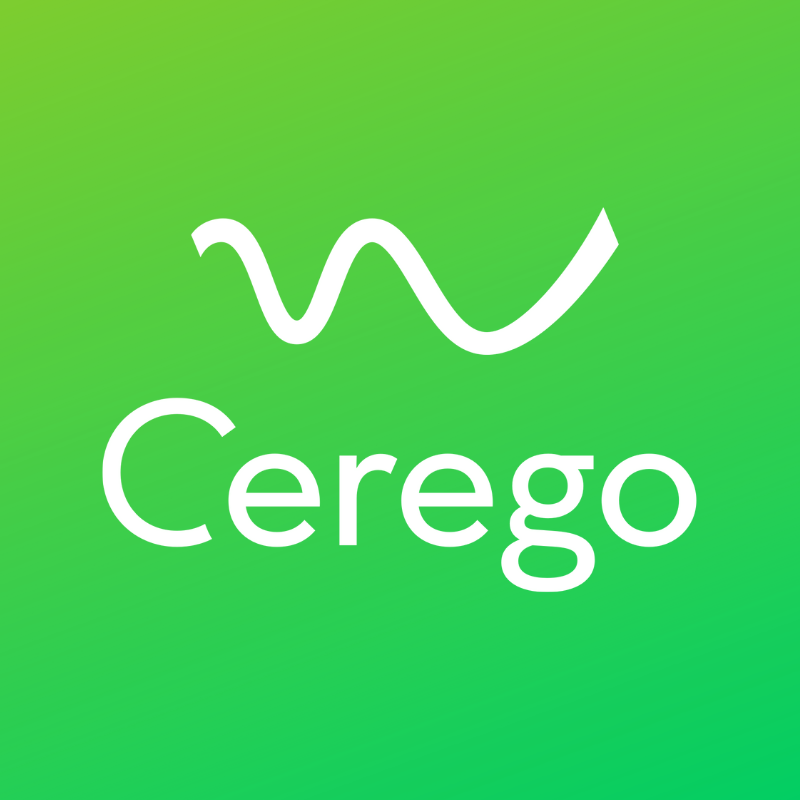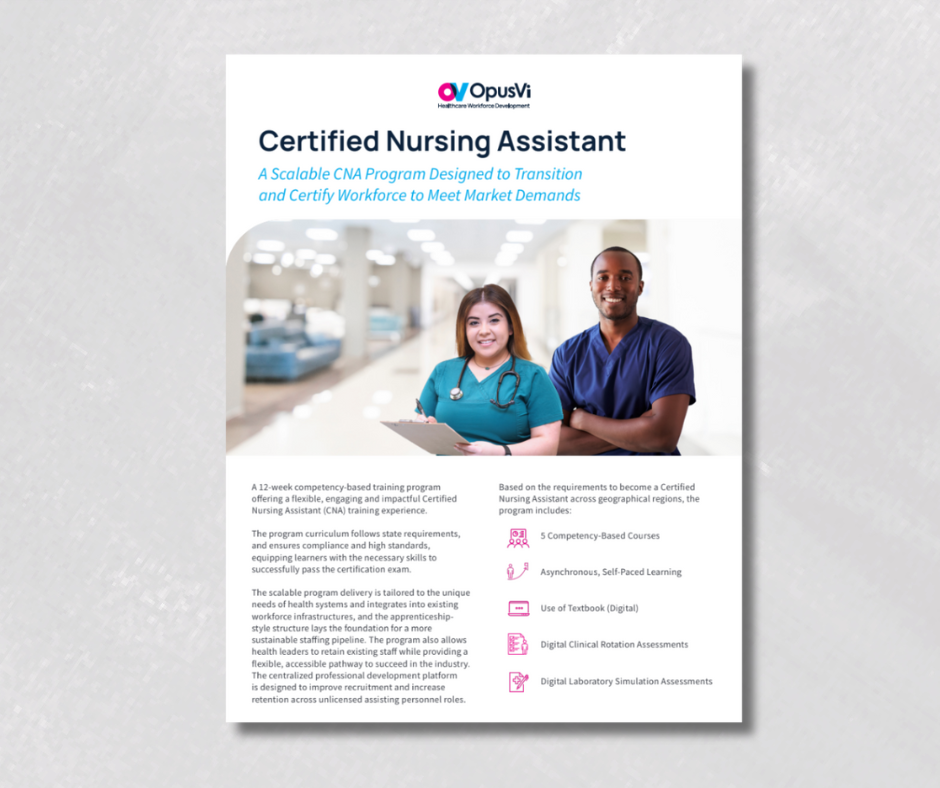
Certified Nursing Assistant
Certified Nursing Assistant Training Program
Online Custom Solution
We work with organizations to retain and upskill their workforce in foundational clinical skills and CNA certification exam preparation, creating clear pathways for internal advancement.
A flexible and engaging CNA training program meticulously crafted to equip learners with the essential competencies required to successfully navigate the state certification exam. Our program goes beyond exam preparation, offering comprehensive insights, practical skills and interactive modules designed to ensure learners are practice-ready upon completion. Participants will engage with real-world scenarios and receive personalized guidance, fostering not only exam success but also long-term excellence and confidence in their professional practice.
Duration:
Min 60 Hours
Min Cohort:
10

A Flexible, Scalable and Workforce-Ready CNA Training Solution to Build a Stronger Healthcare Team
OpusVi’s Certified Nursing Assistant (CNA) Training Program is a dynamic and engaging solution designed to build a compassionate, practice-ready workforce while easing operational strain on healthcare organizations. Delivered through a centralized professional development platform, this program is engineered to elevate recruitment, improve retention and streamline the education and certification process for unlicensed assisting personnel.
At the core of the platform is a high-quality CNA program that aligns with state requirements to ensure regulatory compliance and educational excellence. The curriculum equips learners with the critical skills, clinical competencies, and confidence needed to pass the state certification exam and transition smoothly into care delivery roles.
Competency-Based Curriculum
The program curriculum aligns closely with state requirements, ensuring compliance and maintaining high educational standards while effectively preparing learners with the competencies necessary to successfully pass the state certification exam. Its scalable delivery model is designed specifically to accommodate the unique needs of health systems, seamlessly integrating into existing workforce structures. Additionally, the apprenticeship-style framework establishes a solid foundation for developing a sustainable staffing pipeline.
This approach empowers health system leaders to retain current staff by offering a flexible, accessible pathway for career advancement within the industry. Furthermore, the centralized professional development platform supports improved recruitment outcomes and enhances retention across various roles within unlicensed assisting personnel, promoting long-term workforce stability.

OpusVi will provide:
AI-Powered Adaptive Learning
OpusVi’s Certified Nursing Assistant (CNA) Training Program integrates Cerego, an AI-powered adaptive learning platform that personalizes the educational experience for each learner. By leveraging principles of cognitive science, Cerego enhances knowledge retention and accelerates mastery, ensuring that CNAs are not only well-prepared for certification exams but also equipped with long-term, practical skills for patient care.


System Outcomes
- Increase retention of loyal, dedicated frontline staff through meaningful career development
- Build a sustainable, in-house talent pipeline of Certified Nursing Assistants ready to meet organizational needs
- Lower recruitment and onboarding costs by investing in internal workforce development
- Alleviate the burden on nursing teams, reducing burnout and turnover through well-prepared, supportive CNA staff
Learner Outcomes
- Demonstrate comprehensive knowledge and practical proficiency essential to performing the Certified Nursing Assistant role effectively in clinical settings
- Acquire essential competencies and targeted strategies necessary to confidently pass the state certification exam
- Engage in interactive modules, realistic clinical scenarios, and personalized mentorship designed to support immediate exam success and cultivate long-term professional excellence and readiness for practice

Learner FAQs
Shared Common Competencies
- Leadership
- Communication
- Quality and Patient Experience
- Mental Health, Substance Abuse
- Resilience
- Cultural Engagement
Specialty Areas Supported
Unit-Specific Pathways
- MedSurg-Tele
- Neonatal Intensive Care Unit (NICU)
- Acute Rehabilitation Unit (ARU)
- Intensive Care Unit (ICU)
- Emergency Room (ER)
- Labor & Delivery (L&D)
- Mother Baby Care (MBC)
- Operating Room (OR)
- Cath Lab
- Hospice
- Behavioral Health
- Critical Access Hospitals
Specific MedSurg Competencies
- Surgical Care
- Integumentary
- Respiratory
- Hematology
- Cardiovascular
- Gastrointestinal
- Renal
- Endocrine
- Neurological
FAQs
We are your partners from start to finish. View this FAQ for more information on who brings what to the table.
Curriculum
Competency-Based Modules
- Module 1: Foundations of the CNA Role
Introduces learners to the fundamental responsibilities, professional standards, scope of practice, and ethical considerations central to the CNA role. - Module 2: Teamwork & Effective Communication
Focuses on cultivating collaborative skills, emphasizing clear communication strategies, teamwork, and interpersonal effectiveness within healthcare settings. - Module 3: Environment of Care
Covers safety practices, infection prevention, patient hygiene, and maintaining a therapeutic environment for optimal patient well-being. - Module 4: Care Across the Lifespan
Examines specialized caregiving approaches, emphasizing age-appropriate care techniques and patient-centered support from infancy to older adulthood. - Module 5: Disease Processes
Introduces basic anatomy and physiology, exploring common medical conditions, their symptoms, and CNA-specific strategies for providing supportive patient care. - Module 6: Intellectual Disabilities, Mental Health, Cognitive Issues, and Comfort Care
Addresses caregiving strategies for individuals with intellectual, mental, or cognitive impairments, emphasizing compassionate comfort care and patient dignity. - Module 7: Standard of Care – Essential Functions Part 1
Provides detailed instruction on fundamental CNA clinical tasks and responsibilities, including foundational patient care and essential skills. - Module 8: Standard of Care – Essential Functions Part 2
Builds on prior skills by focusing on advanced CNA functions, integrating hands-on techniques for complex patient care scenarios. - Skills Lab
Offers hands-on practice and skill-building exercises in a supervised lab environment to reinforce essential CNA techniques and competencies. - Clinical Rotation for Skills Validation
Allows learners to apply skills in real-world clinical environments, validating proficiency under direct supervision and preparing participants for professional practice.
Core Competencies
Basic Competencies:
- Understanding healthcare roles and responsibilities
- Basic anatomy and physiology knowledge
- Infection control practices
- Safe collection and transportation of specimens
Basic Nursing Skills (ADLs):
- Assisting with bathing, grooming, and personal hygiene
- Dressing assistance
- Feeding and monitoring nutritional intake
- Toileting and continence care
- Patient positioning and repositioning
- Assistance with range of motion (ROM) exercises
- Bed-making (occupied and unoccupied)
- Skin integrity maintenance and pressure ulcer prevention
Patient-Centered Care:
- Cultural humility and sensitivity
- Patient privacy and confidentiality
- Identifying emotional and psychosocial needs
- Recognizing and responding to patient distress
- Compassionate end-of-life care
Safety Competency:
- Safe patient ambulation, transfers, and mobility support
- Fall prevention strategies
- Non-invasive pain management and comfort measures
- Crisis intervention and conflict resolution techniques
- Application of non-invasive restraints
Communication and Documentation:
- Effective, clear communication with patients and healthcare teams
- Accurate documentation and EMR maintenance
- Precise measurement and recording of vital signs
- Monitoring and recording intake and output (I&O)
- Being an integral part of the healthcare team
Personal Well-Being:
- Self-care, resilience, and stress management
- Efficient time management and work-life balance
- Commitment to continuous professional improvement
Who Can Become a CNA?
Becoming a Certified Nursing Assistant (CNA) is an excellent path for individuals who are compassionate, dependable and passionate about caring for others. While specific eligibility requirements may vary by state, most programs require candidates to be between 16 and 18 years old and in good physical health. Some states may also require a high school diploma or GED. Prospective CNAs must be able to perform essential physical tasks such as lifting patients and must complete a background check, drug screening and maintain current immunizations. Additionally, candidates must pass both a written knowledge exam and a hands-on skills assessment to demonstrate their competency. More than just meeting technical requirements, successful CNAs are those who bring empathy, patience and a strong work ethic to the essential role of supporting patients and healthcare teams.
Minimum Cohort Size for the Program
Our programs are designed for engaging, career-focused learning in groups of 10 or more. Each participating organization must enroll a minimum of 10 learners to launch a cohort. This format encourages collaboration, shared learning and organizational impact—ensuring your team moves forward together.
What Does OpusVi Provide?
- Learning Management System (LMS) for centralized access to all coursework, assessments, and learning activities
- Digital eBook (Mosby’s Textbook for Nursing Assistants) embedded within the LMS
- Ongoing technical administration and platform support
- Dedicated Community Manager to foster engagement and learner success
- Measurable results reporting to track learner outcomes and program impact
- Adaptive spaced repetition powered by Cerego to boost retention and long-term learning
- Director-level support throughout program implementation and the application process
- System sponsorship and a designated project owner for strategic alignment
- Guidance for Site Administrators during the program approval process
- Strategic consultation to ensure compliance and alignment with workforce development goals
What Does The System Provide?
- Site Administrator to oversee program implementation locally
- Approved Instructor(s) to facilitate skills and theory instruction
- Program Director to ensure regulatory compliance and educational oversight
- Skills lab and clinical site for hands-on training and competency validation
- Necessary equipment and supplies to support both lab and clinical instruction
What Support Is Available?
Technical Administration and Support
OpusVi offers comprehensive wraparound technical administration and support for every program and cohort. These services include:
- End-to-end project management through planning, onboarding and deployment
- Ongoing 24/7 technical and administrative support for each learner
- Enhanced learning technology that identifies and supports at-risk learners to promote engagement and success
- Continuous performance monitoring and detailed reporting to track progress and outcomes
Community Manager
To ensure the success of your Certified Nursing Assistant Program, OpusVi will assign a dedicated Community Manager based on the size and specific needs of your system. This individual serves as a consistent point of contact, supporting user engagement from onboarding to completion. The Community Manager also provides:
- Custom reports and data insights
- Tailored learner interventions and support
- Oversight of system-wide engagement and satisfaction metrics
Director-Level Support
In addition to technical and learner-facing support, OpusVi provides Director-level expertise to guide your organization through the CNA program application and approval process. This includes:
- Step-by-step support for regulatory submissions and compliance documentation
- Participation in strategic planning and stakeholder meetings
- Expert guidance to align the program with state-specific requirements and timelines
Can I Enroll as an Individual?
Our programs are designed for group-based learning with a minimum of 10 participants. While we don’t offer individual enrollment at this time, you’re welcome to organize your own group of 10 or more peers to start a cohort. You can also speak with your employer about enrolling your team through your organization.
Christine Thompson, RN, BSN, MSN Ed.
Director, CNA Programs - OpusVi
With over 30 years of experience as a nurse and healthcare educator, I have witnessed firsthand the essential role Certified Nursing Assistants (CNAs) play within healthcare teams, often serving as the first responders and the compassionate eyes and ears for our patients and residents.
CNAs often face significant challenges, including inadequate support and limited access to comprehensive training. By empowering CNAs with high-quality education and resources, we not only enhance patient care but also create a strong pipeline for dedicated individuals to advance into nursing careers.
Andrew Malley
Chief Executive Officer at OpusVi™
One of the most impactful ways to mitigate the challenges of the healthcare staffing crisis is to focus on the growth of the clinical base with more Certified Nursing Assistants, Medical Assistants and Personal Care Assistants. Building a more robust base to the workforce pyramid with Healthcare Support Workers allows nurses to work at the top of their license while fostering strong staffing pipelines for the future and nurturing a diverse clinical workforce. Work-based, apprentice-style programs like our CNA program, built for Providence, offer a more flexible and rewarding journey for new entrants into the healthcare industry and will enhance retention and expand expertise across the clinical spectrum.
Dr. Sylvain Trepanier, DNP, RN, CENP, FAONL, FAAN
SVP, System Chief Nursing Officer - Providence
Health leaders are facing historic nursing shortages. To address the challenge and better support our workforce, we must radically overhaul our approach to staff retention and workforce development. We’re excited to partner with OpusVi to support our staff in their career journeys and bring more CNAs on board to support our entire workforce. This CNA program helps us fill a critical need within our system and will empower our teams in their careers. More importantly, this effort will allow us to improve patient care and better serve our communities.
Christine Thompson, RN, BSN, MSN Ed.
Director, CNA Programs - OpusVi
With over 30 years of experience as a nurse and healthcare educator, I have witnessed firsthand the essential role Certified Nursing Assistants (CNAs) play within healthcare teams, often serving as the first responders and the compassionate eyes and ears for our patients and residents.
CNAs often face significant challenges, including inadequate support and limited access to comprehensive training. By empowering CNAs with high-quality education and resources, we not only enhance patient care but also create a strong pipeline for dedicated individuals to advance into nursing careers.
Andrew Malley
Chief Executive Officer at OpusVi™
One of the most impactful ways to mitigate the challenges of the healthcare staffing crisis is to focus on the growth of the clinical base with more Certified Nursing Assistants, Medical Assistants and Personal Care Assistants. Building a more robust base to the workforce pyramid with Healthcare Support Workers allows nurses to work at the top of their license while fostering strong staffing pipelines for the future and nurturing a diverse clinical workforce. Work-based, apprentice-style programs like our CNA program, built for Providence, offer a more flexible and rewarding journey for new entrants into the healthcare industry and will enhance retention and expand expertise across the clinical spectrum.
Dr. Sylvain Trepanier, DNP, RN, CENP, FAONL, FAAN
SVP, System Chief Nursing Officer - Providence
Health leaders are facing historic nursing shortages. To address the challenge and better support our workforce, we must radically overhaul our approach to staff retention and workforce development. We’re excited to partner with OpusVi to support our staff in their career journeys and bring more CNAs on board to support our entire workforce. This CNA program helps us fill a critical need within our system and will empower our teams in their careers. More importantly, this effort will allow us to improve patient care and better serve our communities.







Download our brochure.

An organization of 50 employees can save 1,500 sq ft of storage space.*
*According to US Averages
Student FAQs
What is the time commitment?
The modules take 4-6 weeks or about 60 hours to complete. The modules are self-paced and can be taken at the learner's speed.
Where do I take the certification exam?
Each state uses different testing companies to deliver the CNA written examination. This information will be provided in your program information. A grading scale is not typically used. Each exam uses passing standards and other statistics to make sure every candidate gets a fair and equitable distribution of questions.
With several years of experience, medical assistants may look into taking on roles that involve more leadership. Due to their intimate knowledge of clinical operations, they are often well-positioned to become clinic managers. They also may consider advancing into other healthcare occupations such as a registered nurse, physician assistant or nurse practitioner.
How do I get a preceptor for my clinical hours?
The system will be provided with a guide to navigating clinical hours but is expected to align clinical settings and support for intended certified nursing assistants.
Will I get paid while I am taking the program?
This is designed to be an apprenticeship-style program where those intending to become Certified Nursing Assistants can be hired and serve in supporting roles until certification.
Do I need to purchase the book?
No -- the book, Mosby’s Textbook for Nursing Assistants, will come with the program.
How old do I have to be to enroll?
The minimum age to enroll is 16-18 years old.
What are the specific skills I need to learn?
There are no prerequisites to the program outside of onboarding requirements set by the employer.

